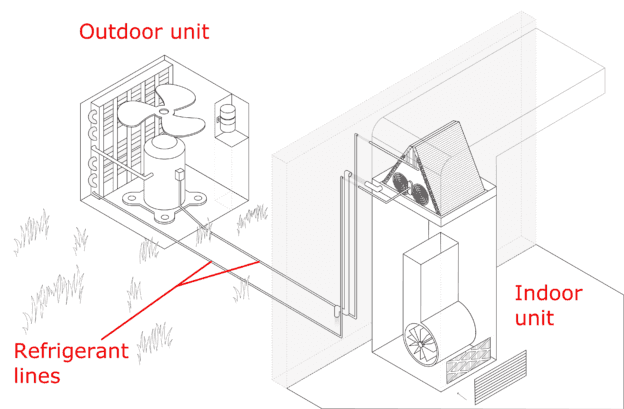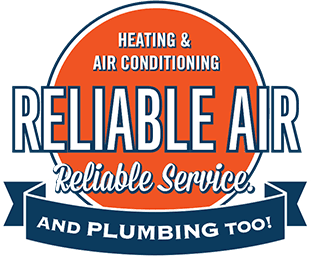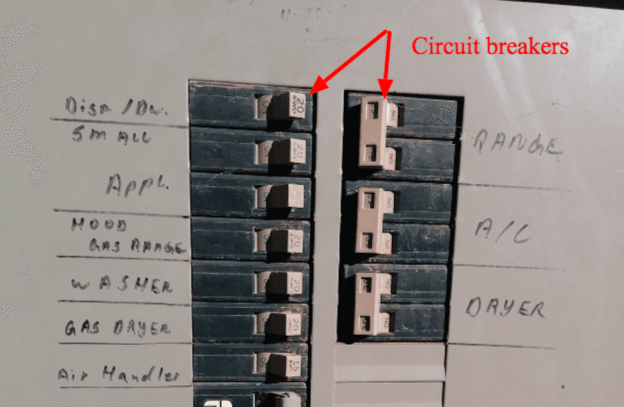Did your air conditioner suddenly turn off?
If you haven’t done so already, check the circuit breaker to see if it “tripped,” or flipped to the OFF position. If it did trip, try resetting the breaker and see if your AC runs normally again.
Important note: If the breaker keeps tripping after a few attempts to reset it, contact a professional for help. Don’t keep resetting the breaker, as this could damage your system even more.
If your AC is still causing the breaker to trip after you reset it, you most likely have one of the following problems:
- A dirty air filter
- Dirty condenser coils
- Low refrigerant levels
- Broken fan motor
- Malfunctioning compressor
- Circuit breaker issue
In this article, we’ll go into more detail and explain how to fix each of these issues.
Want to skip the hassle of troubleshooting and have a trained tech repair your AC? We can help!
Problem #1: A dirty air filter
A dirty air filter restricts airflow to your air conditioner, which makes components like the blower work harder to cool your home’s air.
The harder these components work, the more energy they use. If they use too much electricity, they can cause the circuit breaker to trip.
Solution: Check your air filter. If it is dirty, replace it with a new one.
Problem #2: Dirty condenser coils
Your AC system has 2 main units: one indoors and one outdoors.

The outdoor and indoor units of a central AC system
The indoor unit extracts heat from your home’s warm air and transfers it to the outdoor unit, where that heat is dumped into the air outside.
The outdoor unit disperses that heat via coils (thin fins that surround the outdoor unit). If these coils become dirty, they will struggle to dump the heat outside. As a result, components in the outdoor unit may use more electricity to compensate for the extra workload, which could cause the breaker to trip.
Solution: Do the following:
- Make sure no plants or other objects are within 3 feet from the outdoor unit.
- Clear out any leaves or sticks that may have become lodged in the coils.
- If the coils appear covered in a thick layer of dirt, contact a professional to clean them for you.
Problem #3: Low refrigerant levels
Refrigerant is the substance that circulates between the indoor and outdoor units. Its job is to absorb heat from inside your home and dump that heat outside the outdoor unit.
If you have low refrigerant levels, your system will struggle to remove heat from your home, and your AC will use more power. Eventually, your system could draw too much power and trip the breaker as a result.
You’ll know you have low refrigerant levels if you also notice signs such as:
- A hissing/bubbling sound near your AC
- Higher-than-normal indoor temperatures
- Ice buildup on the indoor/outdoor unit or refrigerant lines
Solution: If you do have low refrigerant levels, that means you have a leak somewhere in your system. Since refrigerant is a potentially harmful substance to humans, you’ll want to contact a certified professional to fix the leak and handle the refrigerant.
Problem #4: Broken fan motor
Your AC system has 2 fan motors:
- One in the indoor unit (called the blower motor)
- One in the outdoor unit (called the condensing fan motor)
Sometimes these motors can develop an electrical short due to normal wear and tear. An electrical short is when electricity escapes from its normal, intended path. This causes more electricity to flow than the wires inside the motor can handle.
When a short occurs, your AC circuit breaker will trip to prevent other components in your system from becoming fried by the electrical current.
Solution: Contact an AC expert for help. Electrical work can be complicated and very dangerous, which is why we recommend contacting a professional for assistance.
Problem #5: Malfunctioning compressor
The compressor is the heart of your AC system. Its job is to circulate the refrigerant and help it change from a liquid to a gas.
Two compressor issues can cause the circuit breaker to trip:
- Hard-starting compressor: When your compressor first turns on, it draws in a lot of electricity. Unfortunately, as a compressor ages, it can pull in even more electricity when it starts, which causes the breaker to trip.
- Grounded compressor: When the electrical winding inside the compressor has broken, it often hits the side of the compressor, creating a short. This short causes the compressor to burn out and will likely trip the breaker as well.
Solution: Contact a professional for assistance. Unfortunately, these issues typically mean you’ll need a new compressor, which is a very expensive repair if your AC isn’t under warranty. In that case, it might be more cost-effective to replace your AC instead of getting a new compressor.
Problem #6: Circuit breaker issue
Finally, the issue could be with the circuit breaker itself and not your AC system at all.
One of the wires connecting to the electrical panel could have loosened, or the breaker could have simply gone bad (which happens over time).
Solution: Contact an HVAC professional to make sure your system is working properly. If the AC technician doesn’t find anything wrong with your system, you may need to contact an electrician for further help.
Need help from a Texas pro? Contact us today.
We guarantee 100% satisfaction on ALL repairs. Visit our AC repair page for more information about what to expect when you hire us to fix your AC system.


